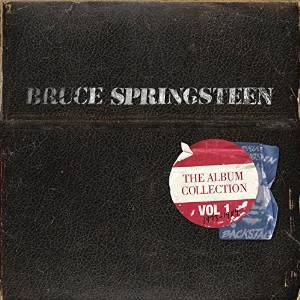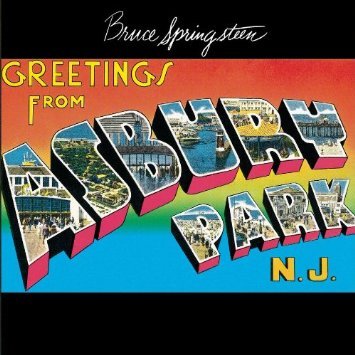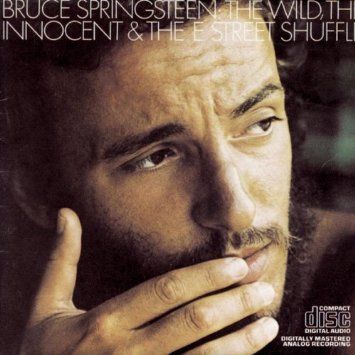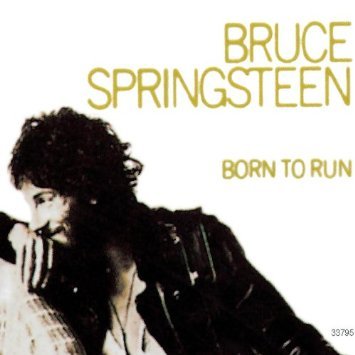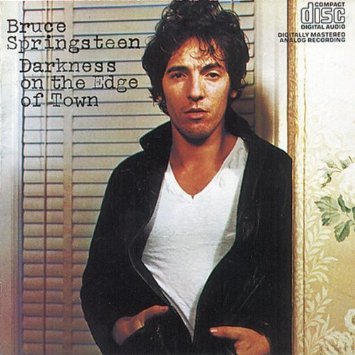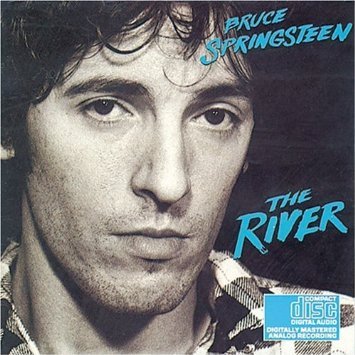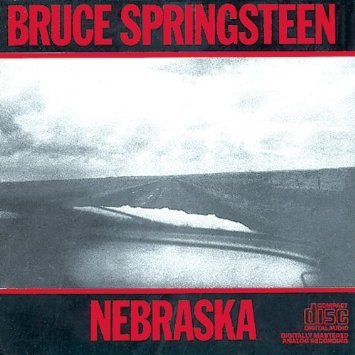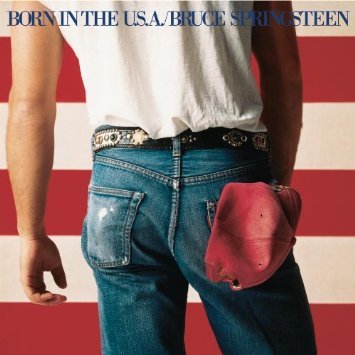BRUCE SPRINGSTEEN -- THE ALBUM COLLECTION, VOL 1 1973-1984 ($99.99 CD; SONY)
You don't own all of Bruce Springsteen's first seven albums. Oh, some of you may think you do, but you don't. Despite his massive popularity and critical acclaim, all but die-hard fans probably have just a handful of Springsteen albums -- Born In The USA of course, maybe Born To Run and one or two others depending on when they first saw him in concert (which immediately sends one to a record store) or were given an album as a gift by a friend who insisted they listen to it...now.
The dedicated fans say, hey, wait a second. I've bought his albums on LP and again on CD and I have them all. But unless you have this new boxed set, trust me, you don't own Bruce Springsteen's first seven albums.
These classics -- the core of why we care about Springsteen some 40 years after he debuted -- came out on compact disc 30 years ago. And they haven't been touched since. Trust me, a LOT of improvements have taken place in album remastering in the past 30 years. If you already bought the anniversary editions of Born To Run and Darkness on the Edge Of Town, you may be annoyed at having to buy them again. But on sale, this set is a bargain. And if they released the set first and then the deluxe editions of those albums, let's face it -- you would have bought them again anyway.
For everyone else, those are casual fans, those who have never bought a Springsteen album, those who own them on cassette or CD or 8-track or whatever, these first seven albums have never sounded better. They are exponentially superior in sound and the artistry and passion of the music comes across like never before. Do you want them? Of course. But do you need them? Oh yes. You get all seven albums beautifully remastered, each one in their own mini-lp sleeve mimicking the original look of the albums. It's exactly what I prefer from boxed sets. Sure, the lyric sheets when available (not every album had them) are super tiny, but hey, you can always google them on the internet. And the scrapbook of photos and articles is merely for show since you'd need a magnifying glass to actually read any of it. Yet overall the set is handsome, compact and most importantly of all, the music has been presented with meticulous care.
One of the great things about a reissue like this is the chance to listen to an artist's work in order in a concentrated period of time. The remastering helps fans hear the music with fresh ears. The intense dive into their body of work also lets you see connections and leaps in growth in ways you simply couldn't before. Presumably, at some point down the road they'll release these albums individually and those who are not on board yet can sample one of the big albums before buying more. But if you're any sort of fan and wondering if the remastering is worth it, the answer is unquestionably yes.
Bruce Springsteen's debut is the definition of "promising." He's clearly working through his Dylan influences here, with words tumbling out one after another, rhymes being seized upon with vigor. The lyrics don't always make sense, but by god there are a lot of them. The production was always pretty thin here, compared to the later works. It's as if Springsteen and his band were just finding their way around a studio. You have the sense of a guy with a guitar and a rather anonymous band in the background providing support. Here the remastering can only do so much with what was a pretty tepid production in the first place. But the sense of being in early on an artist's development is strong. What's most notable here is how generic the references are to growing up and being blinded by the light. It's exuberant and fun, but there's no sense of place and time -- certainly not the specific Jersey world of losers and dreamers he'd soon create. In "Lost In The Flood" for example, he sings "Nuns run bald through Vatican halls, pregnant/ Pleadin' Immaculate Conception." It's a clever line, but the clever line of a student showing off his skills, of a young guy hoping to shock and shake people up. (And it gets the religious term wrong, but most Catholics do, so we'll give him a pass on that.) It's not rooted in anything real.
You can parse out a meaning from "The gallows wait for martyrs whose papers are in order" or "It's not too late to infiltrate/ The servants are just leaving" (both from "Mary, Queen Of Arkansas") but they're references to ideas or someone else's life, not his own. That would be fine if the surreal, literary landscape of Dylan was where his strength lied. But it's not and Springsteen soon proved that by following the old maxim of writing what you know (and tossing in some myth-making to make the sad reality bearable).
But something funny happens as you listen to this exuberant, shaky debut: it gets better as it goes along. It's like we're watching Springsteen find his feet right in front of us. By side two, he hits his stride. "Angel" is another example of overly clever writing that calls attention to itself. But "For You," "Spirit In The Night" and "It's So Hard To Be A Saint In The City" end the album with a flourish and make you eager to hear what's next.
This is the album of a kid making his case for a record deal. Look what I can do!
On the release of his next album, Springsteen would famously appear on the cover of both Time and Newsweek, crowned the savior of rock and roll. But for anyone paying attention, his greatness was immediately clear on The Wild, The Innocent & The E Street Shuffle. If they're really lucky, some acts debut with a great album...and then struggle to follow it up. They spent years creating and those first ten songs were the best they had. The very few follow up a debut album with one that's even better and then you know you're in for a long ride with this act.
Everything about Wild is remarkably better: the songs and arrangements by Springsteen, the playing of the band and the production are all exceptional. Hearing it remastered is truly astonishing. Springsteen is first and foremost a great live act and what's the inevitable complaint of an album by a great live act? Oh, they didn't capture that sound, that vibe, that sense of occasion that made them so much fun in concert. No one will ever say that about this album. It feels like the great live album Springsteen took so many decades to officially release and never more so than it does now. The packaging isn't elaborate or fancy like on Greetings. You get a great cover, the guys hanging out casually in a group photo on the back and seven songs. Seven long songs. Seven great songs. "The E Street Shuffle" is a self-referencing bit of fun. (Every act gets to name check themselves once in a song.) The feel of immediacy, of being in a packed club as the band kicks into their show is palpable, right down to the break when the song seems to end, you can imagine the roar of the crowd and then they kick back in again. This is an act with confidence and swagger, not a pretender to anyone else's throne.
And the growth in songwriting is extraordinary. From the mostly vague generalities of the first album ("When they said sit down, I stood up/ Growin' up") suddenly we get "4th Of July Asbury Park (Sandy)." Springsteen paints a picture of a world he knows: the boardwalk along the shore, making out with girls under the pier who promise more than they deliver, fireworks as the only bright spot in an other-wise drab life of work. Our hero has been fired from his job for fooling around with the boss's daughter and knows he's gotta get out before the boardwalk is all he'll ever see. But first things first: won't Sandy sleep with him? It's vivid, sad, funny and most of all real.
That's followed immediately by the rave up "Kitty's Back," which I love even more because I have a friend named Kitty. The band is bursting out of the speakers now and though this album has always been a favorite, it's never sounded so rich and strong, with each instrument clear and bright. it was a glorious noise before on CD (and before that on cassette). Now it's detailed and gorgeous. The new sound of this album really takes your breath away on "Wild Billy's Circus Song" (one track I've never heard in concert). Springsteen counts off the beginning of the song "Uh one, two, three, four" and then the tuba kicks in and you're off. When he's whispering into the little boy's ear at the end of the tune, enticing the kid to run away and join the circus, I'm reminded of how rarely we talk about Springsteen's singing. He came into his own vocally on this album, confident, laid back and in command of everything from a big roar to a quiet aside, to an everyman delivery that belied how much work he put into it.
"Incident" is big and bold and of course "Rosalita" is the ultimate showstopper. If you think you've heard that song so many times it can't surprise you anymore, just put this remastered version on and turn it up. Heck, you'll turn the whole album up. And the finale "New York City Serenade" points the way forward to Born To Run, just as the last two or three songs pointed the way forward to Wild. The arrangements show off the band at their best and his songs are big. They're about to get bigger.
This is the album of the band. None better, they boasted...and then they proved it.
Here's a romantic, widescreen album, a young man's album to be sure, bursting with possibility and purpose as only a young man can. Springsteen would never lose his eye for the hard truth, but here's where the sheer joy of making music almost overwhelmed the harsh realities of day to day living. It was recently released in an anniversary edition so you may have already listened to it in much-improved sound and been reminded of how terrific it is.
Like any great album, each song is a gem. "Thunder Road" all alone announces his conflicting emotions: the narrator wants Mary to come have sex with him ("You know just what I'm here for") but at the same time he's vulnerable ("I just can't face myself alone again"). He's no hero, this is a town full of losers, "you ain't a beauty but hey you're alright." What kind of seduction is this? And yet who isn't swept away by the arrangement which builds and builds until you have to imagine Mary would be crazy not to run out and jump into the passenger seat. Time and again, Springsteen reaches out to women as equals. They may be beautiful and bewildering, but he's never a knight on a shining horse. He needs help and maybe, together, they can escape.
Again and again, the lyrics are specific and real, even as he reaches for the epic. Unlike his debut album, every word matters and makes sense. You almost don't realize how evocative and smart they are. Work looms large as it will from here on out. The people in Springsteen's albums want a job or if they have one, trudge through it and live for their nights and weekends. His vocals are so confident and unforced you almost don't think about them, the way you might focus on the vocals in another act. And each song seems to get bigger and bigger. "Night" and "Backstreets" (with it's "love so hard and filled with defeat") and then of course "Born To Run." It's like the camera is pulling back with each song, farther and farther back to reveal more and more of the Jersey landscape, the world he knows so well.
Then comes "She's The One." From the stately, determined opening to the suddenly mature lyrics ("At night when you're kneeling in the dark") to the refrain that gets mightier and mightier with each repetition. How do you follow up a song like "Born To Run?" This is how. And "She's The One" is immediately followed by "Meeting Across The River," another tale of desperate losers, small time hoods hoping they can impress since they've clearly failed to do so before. "This is our last chance," sings the narrator, a guy who stole his girlfriend's radio and pawned it for some cash but is certain he'll return home later that night with a wad of cash he'll score and impress the hell out of her. Finally, there's the epic 11 minutes + of "Jungeland," an epic in every sense. Strings, high drama and the ultimate poem of glory and despair. It was the finale of the album and a dead end musically and Springsteen knew it.
Born To Run is a young man's masterpiece. But if he continued in this direction what would he do? Write longer and longer songs? Entire suites taking up one side of the album? That way led to bloat, to Meat Loaf's Bat Out Of Hell III and other efforts where the only way to top yourself is to bring in a bigger choir and more strings and more words. Springsteen knew it; he created this big sound and then he turned his back on it, stripping the songs back down to raw urgency on the albums to come.
Throughout it all, needless to say, you have Clarence Clemons, the man Springsteen is leaning against and smiling at on the brilliant cover image. His chops were never more than solid, but Clemons provided exactly what was needed in a rock and roll context and those vivid, tuneful solos are the heart of the music here.
This is the album of the saxophone.
There's a reason the lyric sheet -- as well as the name of Springsteen and album title on the cover -- look as if they were punched out on a typewriter. This is an artist focused more and more on the words, on the anger underneath the words and the personal and political reasons that anger is there in the first place. It's reporting from the heart. It took me a while to warm up to Darkness On The Edge Of Town after the sheer sweep of Born To Run which is exactly what Springsteen intended. Time and again, when Springsteen tasted success, he pulled back and delivered a bracing broadside to his fans: you're welcome to come along for the ride but it won't be all fun and games. Are you in?
It's a heavy-sounding album and like Born To Run, it was recently reissued in a deluxe edition with greatly improved sound so you may have heard it anew recently. It benefits tremendously from the remastering of recent years since the muddy production now sounds deep and booming, not murky. (Though frankly, murky works too for the songs here.) Again and again, the weight of work is present here, along with flawed heroes who are not afraid to voice their terrors. On "Badlands" he sings "You wake up in the night with a fear so real" and audiences sing along with joy and release as he describes the fault lines of their lives. "Adam Raised A Cain" is his first great look at the relationship between fathers and sons and his howl of despair is so bone-deep you worry he'll shred his voice for good. "You're born with nothing and better off that way" he announces on "Something In The Night." A more superficial artist would sing about a romance with a prostitute and imagine whisking her away. In "Candy's Room" Springsteen details this doomed relationship with such passion and precision you never doubt for a moment how important it is to the singer (even if you're never sure if it's important to Candy) and at the same time know it won't end well.
Are you depressed yet? No, because the sound of the album is so authoritative, so Old Testament in its booming certainties. Fatalistic? Yes. But also gorgeous and moving and slashing, mainly thanks to the guitars of Springsteen and Steven Van Zandt. Just as we rarely focus in on his singing, we rarely zero in on his talents as an instrumentalist. They're overwhelming here, as important to this album as the saxophone was to Born To Run.
This is the album of the guitar solo.
Springsteen had delivered the wordy joys of Greetings, the band rave-ups of Wild, the sweeping big sound of Born To Run and the hard-edged truths of Darkness. Then, apparently, he thought, why do I have to choose? The result is The River, his swing for the artistic fences, the attempt to write the Great American Novel. And he wasn't leaving any weapon out of his arsenal. The River is a grand summation of everything Springsteen had done, a sprawling double album that gave you everything and more. It's also a step back in terms of production and was even more hampered by a very poorly mastered original CD release. Now finally, we get a CD that does far better justice to the music Springsteen released. It can't overcome what feels like some rushed or under-thought production, but it's far far better than before.
That messy, everything but the kitchen sink is reflected in the ugliest album design of his career. The cover is great, but the back cover is a decent idea tepidly executed. And the sleeves for each LP (or CD) are just ugly, with photos slapped on top of one another in a godawful mess.
And the songs? Well, they're all over the map as well. You'll see their names and immediately flash to great memories, but more because Springsteen and the E Street Band would consistently shred the album versions with live performances that were much better than what you'll hear on this CD. They're good, but they should have been so much better and the versions you hear in your head are the ones you heard on tour. But they are a great clutch of songs and maybe the messy production is intentional. You can just imagine Little Steven clutching his copy of Nuggets and pushing Springsteen not to get tied up in thousands of hours in the studio. You've got a great band, just bash 'em out, get on the road and play 'em live, he might have said.
The album also delivered a first: aTop Ten hit with "Hungry Heart" (which actually peaked at #5). It's a very atypical song. In a career devoted to chronicling the lives of people trapped in dead end jobs and dead end lives, Springsteen hit the jackpot with a song about a guy who abandoned his wife and kids. That's not so surprising, but he sounds so happy about it. "Got a wife and kids in Baltimore, Jack/ I went out for a ride and I never went back," he sings, sounding so exuberant you have to assume it was the smartest thing he ever did. (My friend Amy still won't give Springsteen the time of day because of this song. I tell her, listen to Nebraska, see him in concert, do this, do that, read these lyrics... Not a chance.)
Some of the songs are goofs ("I'm A Rocker"). Some of the songs are so great they chill you ("The River"). Some of the songs feel so deeply personal ("Independence Day") you almost couldn't listen, until Springsteen opens up in a monologue about his dad that somehow frees you to think about your own folks. It has lulls. But unlike so many double albums, you don't immediately start editing it in your own head to create a superior single album out of the surfeit of songs. The River is what it is and the bumpy ride is part of its charm.
This is the album of Little Steven and his garage band dreams.
The River desperately wants to be great. Nebraska just is great. Famously, it was a collection of demos but every time Springsteen tried to flesh them out with the band, something was missing. Finally, he just put it out, scratches and hiss tape and all. It's his masterpiece, the ten best songs on one album of his career. It's no surprise this album has been paid tribute to repeatedly -- country acts in the US and rock acts in the UK have recreated the album in its entirety, track by track. Others will surely do it again. I look forward to the deluxe version someday. They could include a second disc of band performances of these tracks because over the years they've delivered terrific full-bodied arrangements of these songs, always maintaining the stark integrity of the original arrangements but killing it in concert anyway. Songs on here have inspired entire movies, they're so vivid and real. It just doesn't get any better.
But why remaster it? Isn't part of the beauty of this album its lo-fi origin? Hey, I've got a Victrola and a stack of 78s so I'm not afraid of a little hiss. And I love collections of rarities from the 1920s and 1930s that sound -- at best -- as if someone shoved a microphone down the speaker of one of those hand-cranked beauties while a needle scratches out a sound. But remastering Nebraska doesn't erase any artistry or "pretty up" a lo-fi sound; it just reveals better than ever the performance on the tapes.
And boy is it a stunner. Put this on and you'll think Springsteen has walked into your room, sat down and started strumming his guitar. It's that intimate and "present" in its sound, You'll get a slight hiss at the start of "Johnny 99" and here and there. But by and large, it's stark and beautiful and riveting. Ideally, you should be driving down a two-lane highway late at night while listening to this for the first time. But it'll turn any room or any sunny day into a glimpse of the real badlands. Just as Darkness was a response to the out of control hype surrounding Born To Run, this proved the perfect riposte to the radio success of The River.
This is the album of the song, ten of them presented simply and directly and perfectly.
Turns out you really could amp up the songs on Nebraska. Without sacrificing any of their razor-sharp insights on the state of the nation, the songs on Born In The USA have an infectious pop sheen that is almost startling after Nebraska. The synth on "Dancing In The Dark" is the biggest shock of all, as clear a bid for pop glory as you'll ever hear. Since it was the first single, that synth was especially jolting. On the album, synthesizers are used sparingly throughout so they don't prove so unsettling for rock and roll purists. But it worked: the song was the biggest hit of his career (#2) and kicked off one of the best-selling albums of all time. He hasn't seen the Top 10 singles chart in 20 years and the only reason he got there regularly began with that da-da-da-da-dum riff on "Dancing."
That song also has some of the laziest lyrics he wrote in a long time. "I need a love reaction" and "this gun's for hire" aren't worthy of him. Yet there are a lot of other lyrics on what seems like a silly single. The singer gets up in the evening and comes home in the morning, so he works the night shift. He wants to change his clothes, his hair, his face. He's trying to write a book. Sure he's looking for a little fun, but this man lives in the real world. Why begrudge him a little release?
The rest of the album maintains the lyrical standards set by Nebraska, from a guy working at a car wash where all it ever does is rain to a Vietnam vet literally howling in despair as he feels abandoned by a country he risked his life for. (You'd have to be a fool to think the title track was a fist-pumping flag waver and Springsteen did everything he could to drive that home.) "Working On The Highway" is a brilliant tune: the guy begins by working on the roads with a crew, picks up an underage girl, gets arrested...and ends up back on a crew, fixing roads, but this time for a prison gang. On "Darlington County," two guys have a lark and the one heads on home while his buddy is cuffed and headed off to jail.
And it's all so damn catchy. But the remastering drives home how little "pandering" there was to a pop sensibility, "Dancing In the Dark" aside. This album rocks and it's more that Springsteen reasserted rock's spot on the pop chart than changed his tune to woo the radio. The haunting "I'm On Fire" is as unlikely a pop hit as you'll hear and yet his music was so big it went all the way to #6.
I do try to come up with a better song order. Three of the first four tracks on side two are nostalgic, looking back numbers. And while "No Surrender" and "Bobby Jean" and "Glory Days" are veery different in their ways, they are so thematically similar I wish they could be spaced out. But it's pretty hard to rethink an album so engrained in your memory like this one. And the sum is greater than its parts, with the overall impact just as powerful today as it was when it ruled the radio alongside Prince.
And then there's "My Hometown." Others might celebrate small town life with blind devotion or long wistfully for an earlier time when things were simpler, easier. Springsteen evokes with sincerity the joy of knowing where you're from and what that can mean. But he also shows the world as it is, the couple that has seen an economy wipe out their small town and force them to get ready to pack up and move on like the Joads. A father puts his son behind the wheel of the car and tells him to take a good look around and remember his hometown. Not because it's where he's from and where he'll live and die. Not because he's meant for better things and should remember his roots. But because it's disappearing right before their eyes. You can take albums you know so well for granted. The remastering here gives these songs an extra punch, new detail you might not have noticed before and brings it alive again.
This is the album of the drums, with Max Weinberg driving every song forward. It's the heartbeat of an album they knew literally everyone in the world would be listening to...even if the rest of the world didn't know it yet.
So here are Bruce Springsteen's first seven albums. Five of them are easily among the best of their respective years and two or three are stone cold classics. (Your two or three will differ from my two or three.) Springsteen remains a vital live act and continues to dependably deliver some great songs and every once in a while a very good to great album, like Tunnel Of Love and Wrecking Ball and for me his late period masterpiece We Shall Overcome: The Seeger Sessions. (Sequel, please!) But there's no question the core of his claim to fame resides right here. And they've never sounded better.
Thanks for reading. Michael Giltz is the founder and CEO of BookFilter, a book lover's best friend. It's a website that lets you browse for books online the way you do in a physical bookstore, provides comprehensive info on new releases every week in every category and offers passionate personal recommendations every step of the way. It's like a fall book preview or holiday gift guide -- but every week in every category. He's also the cohost of Showbiz Sandbox, a weekly pop culture podcast that reveals the industry take on entertainment news of the day and features top journalists and opinion makers as guests. It's available for free on iTunes. Visit Michael Giltz at his website and his daily blog.
Note: Michael Giltz was provided with free copies of the CD boxed set with the understanding he would write a review.

